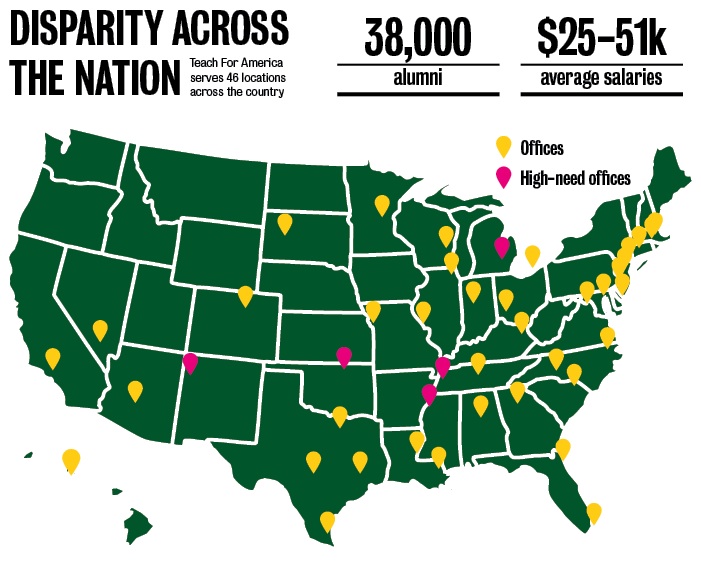
Maia Ferdman
Published on September 23, 2012.
We live in a country where your socioeconomic background often determines your chances of graduating from high school and college. Now more than ever, we need a generation of dedicated thinkers and doers to create comprehensive reforms to our education system.
Teach For America, the organization that was founded more than 20 years ago by an optimistic college senior, provides an opportunity for the best and brightest of college graduates to take the first step on that path.
But TFA has been critiqued for its seeming short-term approach and lack of teacher preparation.
In reality, for a majority of corps members, TFA is not a mere two-year stint. Sixty-seven percent of corps members remain full-time in education beyond their two-year commitments. In addition, half of corps alumni stay in the field of education.
And though, according to Julian Vasquez Heilig, a professor from the University of Texas at Austin, 80 percent leave the classroom after four years, that’s still four more years of enthusiastic teachers and four more years of being exposed to the inequalities rampant throughout our educational system. The program isn’t perfect, but it is trying to reach the communities most in need. This can only be a good thing.
So while TFA may not be the long-term solution for our educational system, it does expose college graduates to its serious inequities. Regardless of whether corps members continue to work in education, the fundamental benefit is that the program fosters a newfound passion for equality in a generation of workers across disciplines.
Oscar Perez, a UCLA alumnus and the Teach For America manager of outreach and recruitment, said that his experience was definitely eye-opening.
“Leaving a bubble (like Westwood) and entering these communities with so many disparities can be somewhat of a shock,” he said.
However, he claims the experience, although one of the hardest in his life, was one of the most rewarding. This is clearly the case, considering that he continued working for the organization to recruit Bruins and other college students.
One main criticism of TFA is that it attracts college graduates who are not wholly dedicated to education, but seek a steady job and a resume booster.
It may be true that TFA is an attractive option for college seniors who are worried about their job security. But it is also an incredible opportunity for students who are genuinely interested in pursuing education, but want a taste before committing to a lifelong career in it.
Although UCLA alumna and current corps member Chelsea Kraft originally wanted to be an elementary school teacher, she was placed in early childhood education with pre-kindergartners. The experience has alerted her to the vital importance of early childhood ““ the young age when children develop their most basic learning and critical thinking skills ““ and she wants to continue teaching young children as a result.
This is just one example of how TFA can service those already committed to education. By allowing prospective teachers to experience a particular subject or age group, TFA allows those graduates to learn where their strengths and interests lie.
But while the program clearly benefits bright-eyed, philanthropic college students, does it really serve those truly in need ““ the children they teach?
TFA serves those children at least as well as other teaching programs: Corp members go through the same hiring process as any other teacher, and are put through rigorous training before they enter any classroom.
The program then supports the new teachers throughout their two years. Once in the classroom, corps members are monitored and mentored and attend monthly professional development days. All members finish the program as credentialed teachers, and some TFA locations have partnerships with master’s programs in education.
According to some studies, TFA teachers often produce higher results and greater improvements than other teachers. Some other studies are mixed or inconclusive because of the high teacher turnaround.
It’s true, though, not all TFA teachers are life-changing educators ““ they vary in skill and proficiency the same way any other teacher might.
Perhaps adding a year to TFA’s commitment may give corps members more time to develop as teachers, and therefore, more time to make a real and noticeable impact on their students.
“TFA is not here because we claim we’re better than other teachers. … (We are) part of the exact same fight,” Perez said.
Although TFA is not the perfect example of an accelerated teacher training program, it does open doors for college graduates who would not have otherwise considered education, and for those who wish to learn more about it.
Most importantly, though, it has created a rapidly expanding army of college graduates committed to fighting inequality in education.
Email Ferdman at mferdman@media.ucla.edu. Send general comments to opinion@media.ucla.edu or tweet us @DBOpinion.
